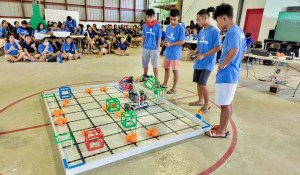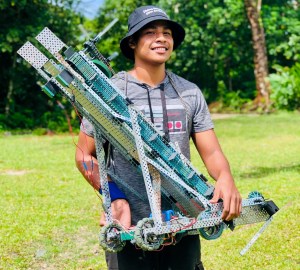High school-based robotics in Micronesia has always been student centered and student driven. Now Habele, the US nonprofit that initiated the Robo League, looks to make that local ownership official. The NGO is sunsetting its role as steward of the Robo League after more than a decade.
Habele’s introduced high school robotics to the FSM in 2012 when the charity initiated a two-school pilot project in Yap, funded entirely by private individual donations. From 2017 through 2023 the Robo League expanded across the all four FSM states through the generous support of an Insular Affairs technical assistance grant, growing into a scalable demonstration project, serving students at two dozen public and private high schools throughout Micronesia.

The basic unit of the Robo League has been school-based clubs at the high schools. Students worked to design, build, test and refine simple robots capable of navigating obstacles and accomplishing tasks.
With training and benchmarks along the way, the students worked over the course of the school years toward multi-school, annual statewide robotics exhibitions. Schools’ robots were pitted against one another in friendly competition. Habele provided equipment, in-person and online instructional opportunities, and facilitated organization of schools to make it possible. The real work was done by the eager and ambitious Micronesian high schoolers themselves.

This model, evolved and refined over a decade with state specific adaptations, was educationally effective and economically efficient. Because students learned and mastered skills through hands-on problem solving themselves, the Robo League did not require costly spending on new buildings, the hiring or retraining of additional school staff, or a particularly large outlay on equipment and supplies.

With each passing year the role of the school staff, and more significantly the student themselves, in overseeing instructional and administrative aspects grew. Through a “peer-to-peer” model, experienced students and staff provided instruction and support to new league members. Robo League teams also represented the Micronesian nation in international robotics competitions in 2017 and 2022. A group of “robo ambassadors” even flew to the Marshall Islands in 2019 to introduce robotics to students on Kwajalein.
“A decade ago, we set about to see if Micronesian students could be excited and educated about Science Math Engineering and Mathematics (STEM) in effective ways that didn’t rely heavily on existing personnel, equipment and infrastructure,” explained Neil Mellen, Habele’s Founder and Executive Director. “At the time I could not have imagined it would grow to involve two dozen schools across Yap, Chuuk, Pohnpei and Kosrae States.”

“If Micronesia’s state and national leaders see value in what was done and learned, they may choose to sustain and further evolve the Robo League through localization of the funding and operation of the league. It would be exciting -to see this moved from practice to policy- but certainly that is their choice to make, not mine,” continued Mellen. “Either way, I’m tremendously proud of what so many students and educators have accomplished over the last decade through the course of this endeavor.”
Though winding down its role in the Robo League, Habele will continue to offer tuition scholarships to students attending private elementary and high schools in the FSM, donations to schools and libraries, direct monthly book deliveries to children under the age of five (“Young Island Readers”), and donations of tools to traditional carvers and weavers. Learn more at www.habele.org

